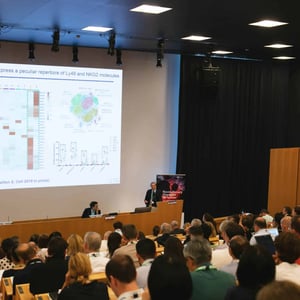Three true giants in cancer research met at the IBSA Foundation Forum “Revolutionary therapies for cancer“, which was held in Lugano on June 21, 2019: the US researcher Carl June, pioneer of CAR-T cells and director of the Center for Cellular Immunotherapies of the University of Pennsylvania; Michael Hall, professor at the Biozentrum of the University of Basel, and initiator of an area of study on the mTOR protein (crucial for the growth of cells), which has led to the development of drugs to treat different types of tumors; and Alberto Mantovani, professor at the Humanitas University of Milan and scientific director of the Humanitas Research Hospital, who with his research was one of the first scientists to get involved in immune-oncology.
Finally, Solange Peters, the future President of the European Society for Medical Oncology (ESMO), talked about how “precision medicine” has changed the way of treating several types of lung cancer.
Below is a summary of the new avenues of research outlined by the speakers.
Alberto Mantovani
It is without doubt that in the last twenty years studies in the immunology sector have changed, and will continue to change, our way of dealing with cancer. We have discovered that the body’s defence system can identify cancer cells, surround them and infiltrate them, but then, in certain cases, it stops, without destroying them. Our goal now is to get to the point of ensuring that the body is able to defend itself “fully”, without being slowed down by tumors.
Among those that “police” the immune system, macrophages play a particularly active role in helping tumors. These cells are a key component in inflammation: they act as a very important defence mechanism, but in certain cases can also set the stage for tumors. Today we have proof of macrophage recruitment, by cancerous cells, and of the functional skewing of these “corrupt agents”. Of course, as we gradually identify these mechanisms, it will also become possible to find new therapies to block them.
Through our lifestyles, however, we can do a lot to reduce the risk of cancer. There is a very simple formula: zero, five, thirty. What I mean is: zero cigarettes, five portions of fruit and vegetables a day and thirty minutes of exercise. If we applied this little rule consistently every day, we could avoid hundreds of thousands of new cases of cancer.
Michael Hall
The TOR protein regulates the growth of cells and, also because of this, plays a central role in the development of many tumors. This protein can be slowed down by a drug called rapamycin, or by other similar drugs. However, a new generation of molecules capable of blocking the TOR protein with mechanisms of action that differ from rapamycin are also being studied. In this regard, we are waiting for the results of the first clinical experiments conducted.
TOR is found in all eukaryotes (i.e. in those, like us, that possess cells with a clearly defined nucleus, containing DNA), from yeast to plants, worms, flies and even mammals, and therefore humans. It is implicated in the development of cancer, but appears to play a key role also in aging and in disorders such as cancer, cardiovascular disease, obesity, and diabetes. In light of this evidence, the possibility of not limiting the use of drugs that inhibit TOR only to cancer is being discussed. However, many studies will be necessary, because the role played by TOR in coordinating and integrating overall body growth and metabolism is not yet clear, whereas the role that this protein plays in controlling the growth of single cells has been more clearly identified.
Carl June
CAR-T cells are T lymphocytes (fundamental elements of the immune system) that are taken from the blood of the patient and genetically modified, using special viruses, to ensure that they recognize cancer cells (thanks to special receptors), and are then reinfused into the same patient, after being multiplied millions of times in the laboratory. CAR is the acronym of Chimeric Antigen Receptor. CAR-T cells are an important cancer therapeutic, capable of treating diseases that cannot be cured with other drugs and, hence, have been approved by the US, Canadian and European health authorities for the treatment of B cell malignancies in pediatric and adult patients (acute lymphoblastic leukaemia and several types of advanced lymphomas). Now the challenge is to extend the use of this therapy also to solid tumors (not only, therefore, to those of the blood and lymphatic system).
CAR-T cells, as we said, have demonstrated, after many years of study and attempts, that immune cells empowered through genetic engineering can be used as an important new class of cancer therapeutics. However, it will most probably be appropriate, or necessary, to integrate this new pillar of medicine with the more classic pillars of chemotherapy and radiation therapy.
Another challenge for research is that of rendering CAR-T cells increasingly reliable, effective and safe. In this regard, the continuing emergence of new techniques for cellular genetic engineering provides a set of tools for programming immune cells in an increasingly precise manner, making way for the next generation of smart T cells.

